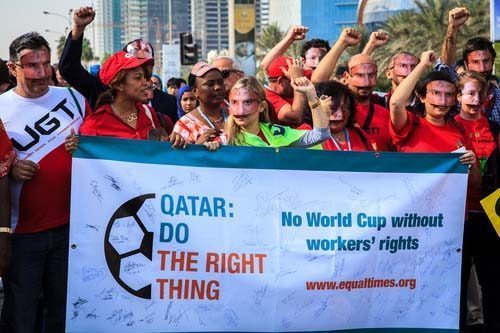
More than a dozen labor advocates and trade union representatives joined the COP18 climate change march this morning, calling on Qatar to improve its human rights standards for migrant workers.
Delegates from Nepal, India, Latin America, Europe and more are in Doha to hold meetings at the United Nations Climate Summit and discuss – among other topics – Qatar’s treatment of these expat laborers.
“Climate change is related to workers’ rights, especially in Qatar,” said Binda Pandey, a Nepalese member of the International Labour Organization (ILO) Governing Body. “It is very hot and workers are coming and working outside – it’s only going to get worse.”
The ILO and the International Trade Union Confederation (ITUC) have repeatedly expressed concerns about Qatar’s hosting of the 2022 FIFA World Cup as well, and have sought to shame the country into taking action by drawing international attention.
“The international community is putting its eye on Qatar… little by little it will change, there is no option,” Pandey told Doha News during today’s march.
ITUC has launched a campaign to “fill a stadium” with supporters against Qatar’s hosting of the World Cup. Equal Times, a publication supported by ITUC, has also timed its release of a new report called “Qatar: Grand ambitions, wretched lives” to coincide with COP18.
[youtube http://www.youtube.com/watch?v=zpbFTlYgkuM?rel=0]
The report, and the campaign being promoted in Qatar, uses the story of Nepali worker Bide Majakotias as a reference point for human rights violations here.
It’s a familiar story for those who’ve paid attention to past human rights reports. Majakoti, a married man with three kids, chose to come to Qatar for work to pay for his 18-month-old daughter’s heart surgery.
In Nepal he took out a loan and paid a recruiter to get the job, but was misled about the type of work he’d be doing. After arriving in Qatar, the contractors made him and others “work like donkeys in which ever company they wished.”
Equal Times highlights that international labor laws are being broken, but so is Qatar’s own labor law, with many employers not providing safety equipment or covering the costs of job-related injuries.
“Workers are responsible for their own safety,” Majakoti says he was told.
ILO representative Pandey says there is hope for workers here though. She told Doha News that ITUC’s Secretary General has met Qatar’s Labor Minister and the National Human Rights Committee.
“He [the Labor Minister] ensured the situation will be improved… Qatar will be making a workers’ charter,” she said. The minister also asked the group to help identify companies violating the law.
Here is the Equal Times full report:
Thoughts?
Credit: Photo by Omar Chatriwala







